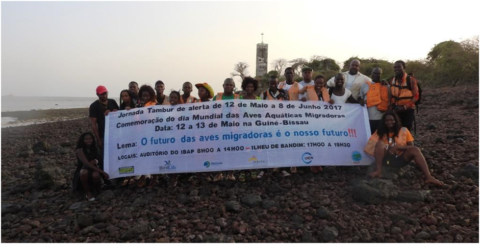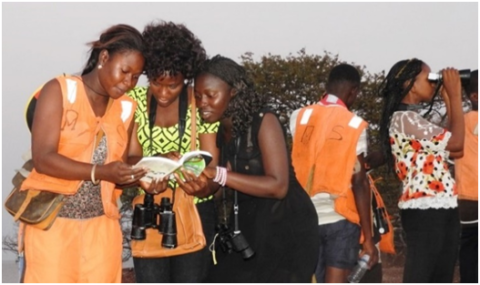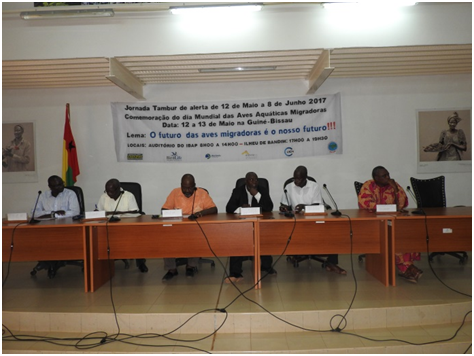World Migratory Birds Day (WMBD) was celebrated on 12th and 13th May 2017 in Guinea-Bissau. An opportunity for the Organization for the Defense and Development of Wetlands and its partners to sensitize the participants especially the school and university environment on the importance of healthy ecosystems for both people and migratory birds. This year’s theme is “The future of migratory birds is our future!”

The celebration of World Migratory Birds Day took a special coloring in Guinea-Bissau because of the importance of its coastline for waterbirds. Nearly one million shore birds from the Arctic, from Canada to Siberia, come to exploit for six months a year the mangroves and mudflats of this small country which has classified 26% of its territory in protected areas.
 Activities were coordinated by the Organization for the Defense and Development of Wetlands (ODZH), the Institute of Biodiversity and Protected Areas (IBAP) and the Cabinet of Coastal Planning (GPC), with the support of their partners (BirdLife, Wetlands International, IUCN and Monte). In the agenda we noted a Conference chaired by the Member of the Parliament Mario Sami, President of the Special Commission on Agriculture, Fisheries, Natural Resources, Tourism and the Environment at the National Assembly, during which several papers were presented on birds migratory.
Activities were coordinated by the Organization for the Defense and Development of Wetlands (ODZH), the Institute of Biodiversity and Protected Areas (IBAP) and the Cabinet of Coastal Planning (GPC), with the support of their partners (BirdLife, Wetlands International, IUCN and Monte). In the agenda we noted a Conference chaired by the Member of the Parliament Mario Sami, President of the Special Commission on Agriculture, Fisheries, Natural Resources, Tourism and the Environment at the National Assembly, during which several papers were presented on birds migratory.
 The following day, May 13, a field visit was organized on Bandim islet. Located in the immediate vicinity of Bissau, it is a dormitory for 8 to 10,000 water birds, mainly shore birds, cormorants and pelicans. Participants, especially young school children and academics, were able to observe the spectacular arrival of birds at sunset. Sensitized on the importance of healthy ecosystems of their country for both people and migratory birds, they have appropriated the slogan of 2017 celebration: “the future of migratory birds is our future» and expressed their readiness to commit themselves collectively to the protection of the environment.
The following day, May 13, a field visit was organized on Bandim islet. Located in the immediate vicinity of Bissau, it is a dormitory for 8 to 10,000 water birds, mainly shore birds, cormorants and pelicans. Participants, especially young school children and academics, were able to observe the spectacular arrival of birds at sunset. Sensitized on the importance of healthy ecosystems of their country for both people and migratory birds, they have appropriated the slogan of 2017 celebration: “the future of migratory birds is our future» and expressed their readiness to commit themselves collectively to the protection of the environment.